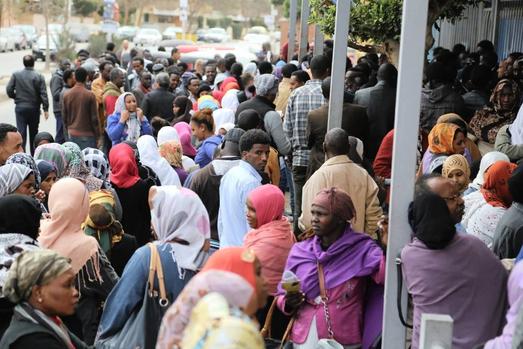Eritrean children who cross borders and deserts alone
August 6, 2017
“The main reason I left was poverty,” Yobieli says. But in Eritrea, poverty and politics are deeply intertwined. “My family was poor because my father was a soldier. He was taken to the army.”
Like all Eritrean adults, Yobieli’s father was conscripted into the country’s national service. On paper, conscription is supposed to last for 18 months. In reality, it stretches on indefinitely, essentially acting as a system of forced labour for recruits who receive next – to – no pay.

National service is the primary reason why nearly 400000 people – almost nine percent of Eritrea’s population – have fled in recent years, including a large number of unaccompanied children.
With Yobieli’s father gone, his mother was forced to work as a maid in other people’s homes. But the money was never enough.
“I stopped going to school in grade four because of the difficulties with my family,” Yobieli says. Instead of attending classes, he tried to find work to help support his family as their situation continued to deteriorate.
But even at such a young age, he knew that not all children faced the same struggles. “I saw young people like me on TV going to school and having a good life, enjoying life. So I asked myself and my friends, ‘Why don’t we have the same life? Why are we living these difficulties?’” Yobieli says.
“We deserve to also have a good life like them. We want to go to school. We want to have a normal life The only solution was to take a decision [to leave].”
Once the decision was made, the first step was fairly easy. Yobieli’s village is close to Eritrea’s border with Sudan, and he was able to sneak across without the help of a smuggler.
On the other side he faced a choice. Most migrants and refugees go to Libya where the chaos of civil war has allowed clandestine migration to flourish. But Libya is also notoriously dangerous. Extortion, kidnapping, rapes, beatings, and detention of migrants and refugees are all commonplace. Last year, more and more Eritreans were opting to come to Egypt to avoid these abuses.
“I heard that the situation in Libya is very difficult because of IS [so-called Islamic State] and the other armed groups and gangs,” says Yobieli. “For the sake of my safety, I decided to come to Egypt.”
The trip across the Sahara requires a smuggler and costs somewhere between $500 and $900. “I didn’t have any money,” Yobieli says. But, he was able to tag along with a group headed to Egypt. Some of the people he was travelling with convinced the smuggler to let him come for free because of his age.
“The trip was difficult,” Yobieli says. “We were hungry and thirsty The situation was very bad. They used to threaten us with knives. They also beat some of us.” Yobieli was lucky. He wasn’t beaten and says the smuggler treated him kindly.
Abel, a 17-year-old Eritrean also living alone in Cairo, wasn’t so fortunate. He fled Eritrea when he was 13, after receiving a draft notice for national service.
Zebib, a 16-year-old girl, broke down when I asked her about the journey from Sudan to Egypt. She left Eritrea in November last year, also to avoid national service. When I meet her in Cairo, she’s wearing a pink shirt with small, white hearts on it, the red nail polish on her fingers is chipped and her curly hair is tied in a messy bun.
She has a smooth, pretty face, but her eyes are burning and her voice is choked with anger. “I wanted to go anywhere I could feel safe,” she says, her voice rising and straining with emotion. “If you can help us, I will tell you everything. If you can’t help us” She trails off as tears start pouring down her cheeks and she buries her face in her hands.
It’s impossible to know what Zebib experienced that made her break down because she won’t talk about it. But rape and sexual abuse are so common along the people smuggling routes from Sudan to Egypt and Libya that women often take injectable contraceptives before starting the journey, according to Swedish-Eritrean migration activist Meron Estefanos.
“A woman knows she will be raped at least three times before she reaches Europe,” Estefanos says. Young girls travelling alone are particularly vulnerable.
Cairo is no safe haven. “We are being treated very badly. When we go out to buy something, we are attacked and beaten,” Zebib says. A group of Egyptian men broke into the apartment where she stays with other Eritreans her age. “They fought with the boys and tried to rape and harass us,” Zebib says. Her lip quivers and she stops talking.
Yobieli also faces problems.
“When I go to the shop, they don’t give me change. They beat me in the street,” he says, referring to Egyptians in the neighbourhood where he lives.
“They’ve spat in my face. I’ve had money taken from me.” – IRIN News


